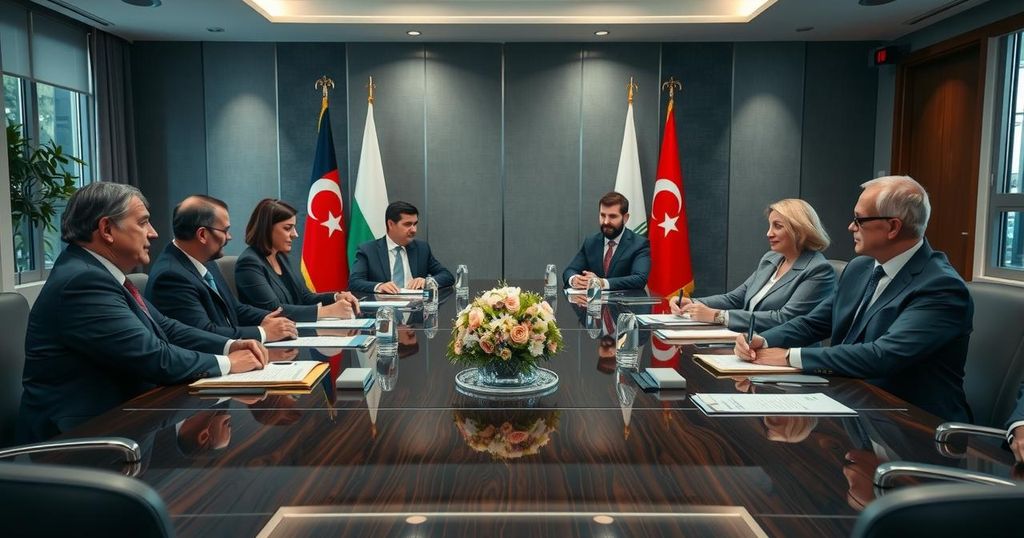Blinken Engages Qatari Officials in Regional Conflict Resolution Efforts

U.S. Secretary of State Antony Blinken met with Qatar’s ruling emir and foreign minister to discuss resolving conflicts in Gaza and Lebanon while emphasizing humanitarian aid for Palestinians. Israel conducted airstrikes amid the conflict, which has resulted in significant casualties, raising fears of broader regional tensions.
United States Secretary of State Antony Blinken engaged in crucial discussions with Qatar’s ruling emir, Sheikh Tamim bin Hamad Al Thani, on Thursday, as part of his diplomatic efforts to address ongoing conflicts in Gaza and Lebanon. In addition, he met Qatari Foreign Minister Mohammed Al Thani prior to anticipated talks with Arab officials scheduled for Friday in London. A significant aspect of Blinken’s agenda involves advocating for an increase in humanitarian assistance for Palestinians in Gaza. Concurrently, France hosted an international conference in Paris aimed at raising funds for those impacted by the conflict between Israel and Hamas in Lebanon. Amid these diplomatic endeavors, Israel’s military announced new airstrikes targeting Hezbollah arms production facilities in the southern suburbs of Beirut. Reports from Lebanon indicated that three soldiers were killed during an Israeli airstrike while conducting a rescue operation near Yater in southern Lebanon. Israel has asserted that its operations are directed against Hezbollah, rather than Lebanon itself, amidst escalating concerns regarding potential wider regional conflicts. In a related development, Syria’s defense ministry announced that Israeli airstrikes in Damascus resulted in the death of at least one soldier and injuries to seven others. Israel has remained largely silent regarding its strikes on targets in Syria, which have predominantly aimed at Iran-linked sites as part of a broader strategy to impede arms transfers to Hezbollah and disrupt Iranian proxies. During his regional tour, which has included visits to Israel and Saudi Arabia, Blinken has emphasized the importance of ending hostilities in Gaza and working towards the release of hostages held by the Iranian-aligned Hamas. He has also directed focus on the eventual resolution of the conflict, engaging in discussions surrounding security, governance, and reconstruction efforts in Gaza. The recent outbreak of violence in Gaza commenced following a Hamas attack on southern Israel on October 7, 2023, resulting in approximately 1,200 deaths and the abduction of 250 individuals. Current reports estimate that Hamas continues to hold around 100 hostages, with a portion believed to be deceased. Israel’s retaliatory measures in the Gaza Strip have reportedly resulted in over 42,700 Palestinian fatalities, a figure that includes several thousand militants, according to the Gaza Health Ministry. Furthermore, Hezbollah and Hamas have been designated as terrorist organizations by the United States, United Kingdom, European Union, and others.
The conflicts in Gaza and Lebanon are deeply rooted in historical tensions and geopolitical dynamics, particularly involving Israel, Hezbollah, Hamas, and regional powers, including Iran. The recent escalation in violence follows Hamas’ major assault on Israel in October 2023, prompting significant civilian casualties and the abduction of numerous hostages. As international attention centers on these conflicts, diplomatic efforts, notably by U.S. officials, aim to facilitate humanitarian assistance, secure hostages’ release, and foster long-term stability in the region. The involvement of various nations in attempting to mediate these issues reflects the complexities of the Middle Eastern geopolitical landscape.
In conclusion, Secretary of State Antony Blinken’s meetings with Qatari officials underscore the urgency of addressing the conflicts in Gaza and Lebanon. His diplomatic tour highlights the critical need for humanitarian aid for Palestinians, the prevention of further violence, and the resolution of hostage situations. The ongoing military actions by Israel against Hezbollah and Hamas, coupled with international efforts to secure aid and peace, indicate a multifaceted and escalating crisis that demands continued global attention and intervention.
Original Source: www.voanews.com








